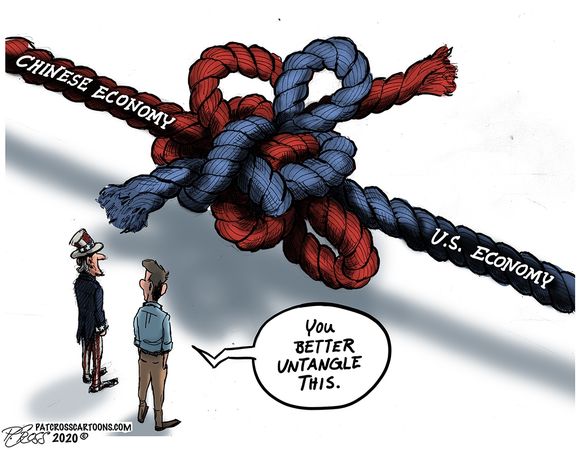China in diplomatic hole over COVID 19 responsibility, keeps digging

Article by Thomas Lifson in "The American Thinker":
China
is badly bungling its diplomatic response to its responsibility for
unleashing COVID 19 on the world, and the consequences for its ambition
to become the world’s hegemon will be profound. As you may have seen,
when Australia announced it would investigate the origins of the
Coronavirus pandemic, China threatened a boycott. The leftist Guardian summarizes the contretemps:
Australia has been described as “gum stuck to the bottom of China’s shoe,” by a Chinese state media editor as Beijing criticised calls for an inquiry into the coronavirus origin as “political manoeuvring,” further straining ties.Australia has emerged as one of the most vocal critics of Beijing as it calls for an investigation into the origins and spread of the virus, which emerged in China late last year and has now killed more than 200,000 people around the world.Late on Monday, Hu Xijin, the editor of the state-run Global Times wrote on Weibo that ties between Australia and its largest trading partner, China, were likely to deteriorate as much as relations between Beijing and Washington had.Criticising Australia for joining the US in its attacks on China, Hu wrote: “After the epidemic, we need to have more risk awareness when doing business with Australia and also when we send our children to study there.”“Australia is always there, making trouble. It is a bit like chewing gum stuck on the sole of China’s shoes. Sometimes you have to find a stone to rub it off,” Hu said.Hu’s comments echo that of China’s ambassador to Australia, Jingye Cheng, who told Australian media at the weekend that pushing for an inquiry could result in a boycott of the country’s goods. “Maybe the ordinary people will say ‘Why should we drink Australian wine? Eat Australian beef?’,” Cheng told the Australian Financial Review.
Even ostensible friends of China in Australia were appalled, as the UK Daily Mail reported:
The head of the Australia-China relations committee has stood down amid growing political strain between the two nations.Warwick Smith has resigned as chairman of the National Foundation for Australia-China Relations, which replaced the Australia-China Council, as government officials clash over China's response to the coronavirus pandemic.The former MP resigned from his role in March where his advisory board was tasked with strengthening ties between the two countries through education, governments, business and cultural and community groups.
Australia’s Prime Minister was not cowed, either:
The Australian prime minister, Scott Morrison, has defied China and defended the “entirely reasonable and sensible” call for an investigation into the origins of coronavirus, as the international political fallout over the pandemic deepened.
The
entire world has suffered grievous injury at the hands of China’s
evident negligence in allowing the virus to proliferate, and its utter
venality in buying up protective gear all over the world, reselling some
at enormous profit when the rest of the world caught up to the
realization of the severity of the outbreak. The only foreign actors
that would defend China are its bought and paid for toadies in NGOs and
foreign lands. And as the World Health Organization is discovering there
may be a steep price to toadyism when the dust settles.
While
the autocratic characteristics of a ruling communist party are to blame
mostly for this pig-headedness, China is also handicapped by its own
history. There is no model in Chinese history for relations among nation
states of equal standing as sovereign actors. For millennia, China’s
foreign relations were built on the ideology of tribute, in which China
was supreme and other nations were allowed to trade with it by offering
tribute to the Chinese emperor, who graciously would reciprocate by
offering goods back to those who understood their place in the hierarchy
below China. The approach to the emperor by foreign envoys required a
ke-tou (kowtow), kneeling and touching the forehead to the ground.
When
this model started to crumble with the two Opium Wars and the onerous
conditions imposed on China, it was not replaced by anything resembling
relations among comparably sovereign nations. Western nations demanded
and got extraterritoriality, making their citizens not subject to
Chinese law and courts, in effect teaching the Chinese that they were as
high-handed as China had been in its glory days, but less civilized
about it. They also extracted penalties from China that impoverished its
government and contributed to a devolution into poverty and chaos.
While
China is skillful in cultivating stooges and infiltrating its agents
into foreign countries in critical spots, when it comes to
state-to-state relations, it has no clue how to treat other nations in
ways that will lead to accomplishment of its goals. It only knows how to
bully. “Political power grows out the barrel of a gun” was one of Chairman
Mao’s favorite aphorisms, after all.
China
has already alienated all of its Asian neighbors, with the possible
exception of North Korea, which is fully dependent on it. Mutually
suspicious, if not antagonistic, nations from Indonesia to Thailand,
Vietnam, South Korea and Japan, are all aghast at China’s dredging of
artificial islands and subsequent construction of military bases and
lodging of sovereignty claims. They are united in opposition.
Now,
China is in the process of expanding its isolation to a global scale.
Its trillion dollar Belt and Road Initiative is being understood as a
method of gaining control over nations foolish enough to enter into
contracts with it.
The
leadership of the Chinese Communist Party may believe that its huge
population and undeniable scientific and technological progress entitle
it to world dominance. But they will find that without real allies, they
will not be able to operate as a successful hegemon. China still needs
critical resources, starting with oil and gas. China’s population will begin declining
in about a decade, the fruit of its foolish one-child policy, and its
age structure will skew toward the elderly, not the ideal war-fighting
demographic.




Post a Comment